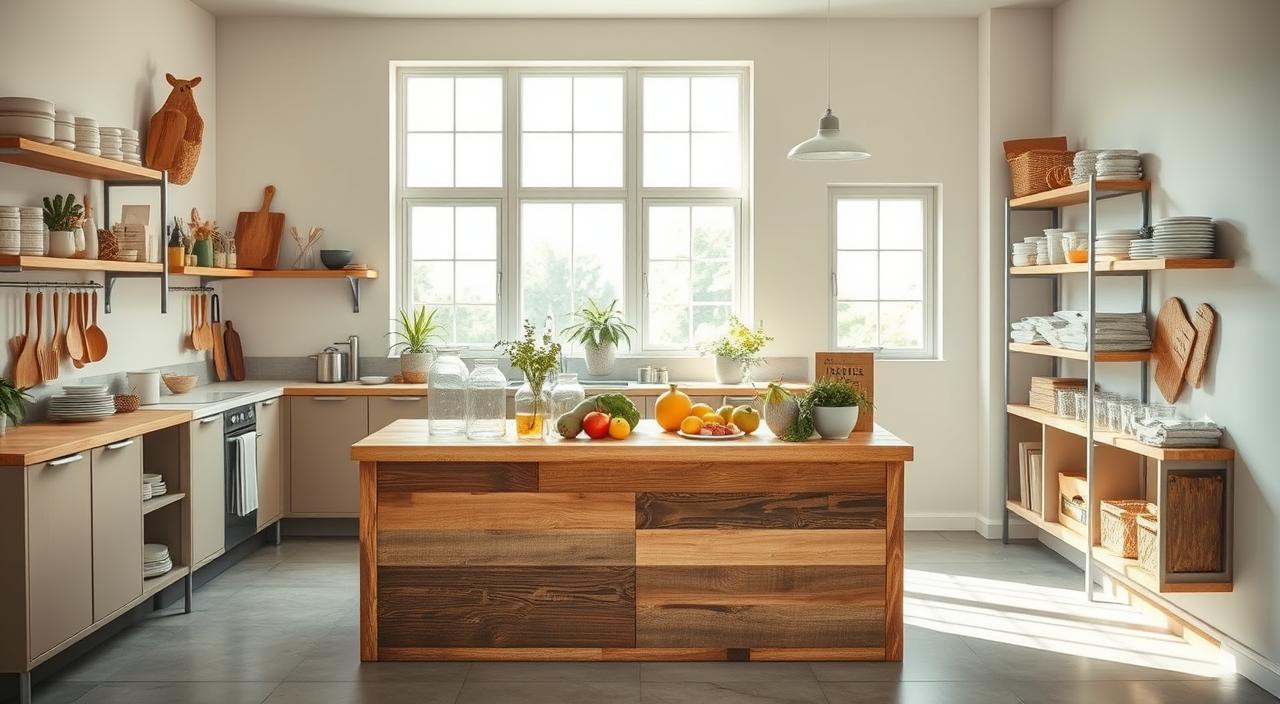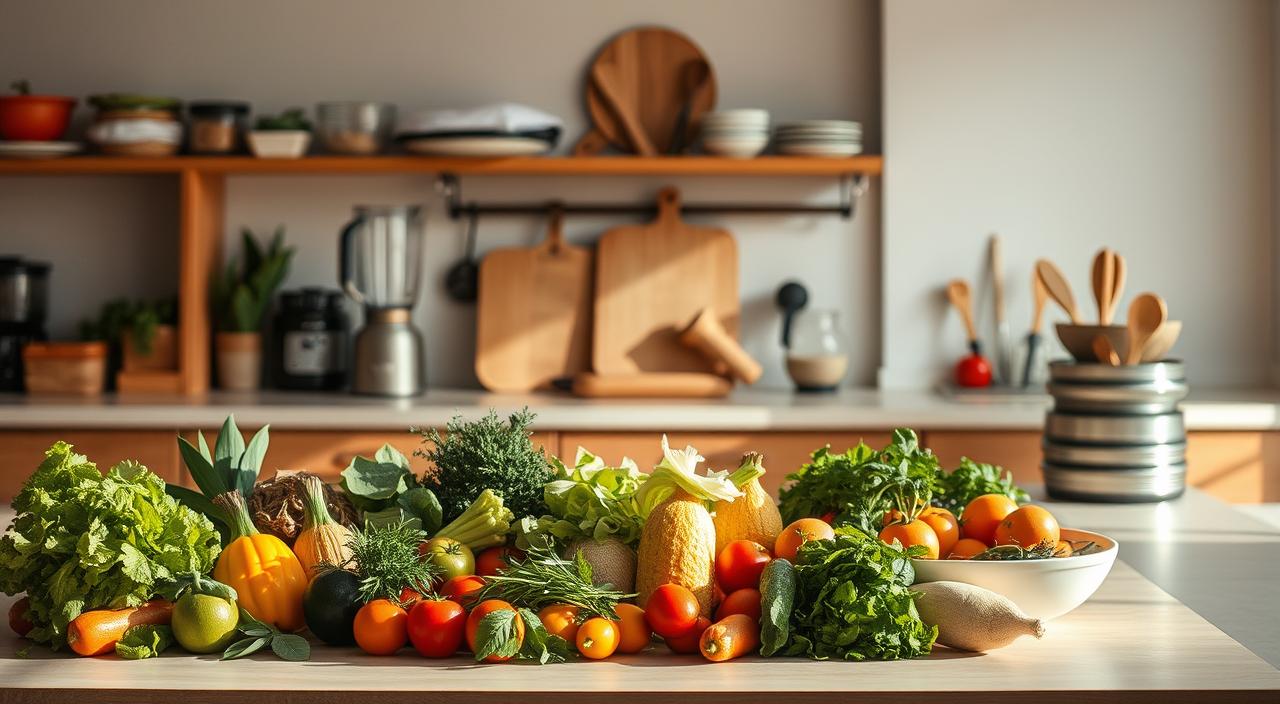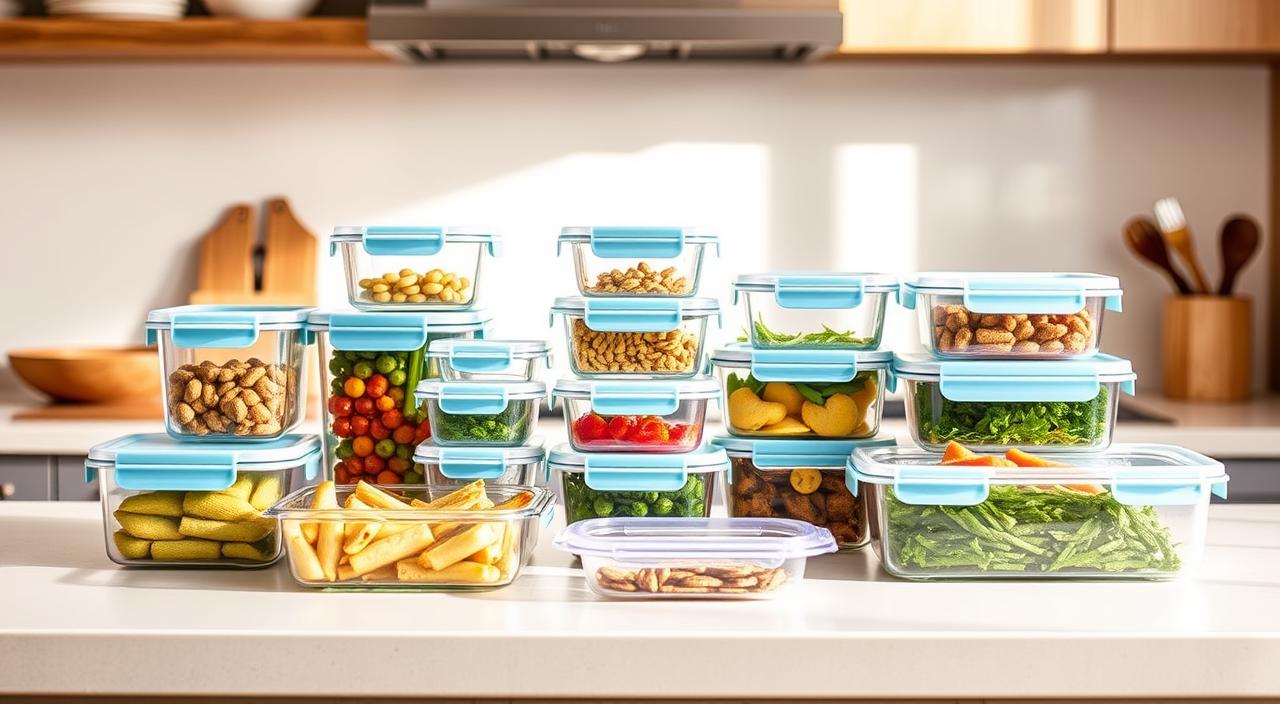Zero-Waste Kitchen Tips UK are more relevant than ever in the modern home. Our kitchens are more than cooking spaces—they’re where families gather, share meals, and build routines. But beneath this warmth lies a hidden cost: bins overflowing with plastic wrap, spoiled leftovers, and food packaging destined for landfill…

Adopting a zero-waste approach in the kitchen doesn’t mean radical change. Instead, it’s about introducing simple, sustainable habits that align with busy modern life. From swapping out cling film to composting scraps, each action helps you waste less, save money, and protect the planet.
In this guide, we’ll explore practical zero-waste kitchen strategies tailored for UK households. From clever storage to composting, repurposing, and mindful shopping—these changes are easy to adopt and make a lasting impact.
Key Takeaways
- Kitchen habits directly affect how much household waste we generate
- Swapping cling film and single-use plastic for reusable items reduces landfill waste
- Creative cooking with leftovers saves money and prevents food spoilage
- Composting organic waste turns scraps into valuable garden soil
- Bulk shopping and correct storage improve food longevity
Why Kitchen Waste Matters in the UK
The UK throws away over 4.5 million tonnes of edible food every year. Most of it comes from our homes—not restaurants or farms. Additionally, packaging waste such as cling film and takeaway containers clogs recycling systems and contributes to long-term environmental harm.
Methane from rotting food is a powerful greenhouse gas, and plastic pollution poses serious risks to wildlife. But there’s good news: small behavioural changes can make a massive difference.
1. Rethink Daily Kitchen Habits
Reduce Reliance on Single-Use Items
Instead of cling film, opt for beeswax wraps or silicone lids. These alternatives keep food fresh and are reusable for up to a year. Glass jars make excellent storage for dried ingredients or leftovers without the risk of chemical leaching.
Freeze Surplus Herbs and Veg Trimmings
Leftover parsley stalks or carrot peels? Store them in a freezer-safe bag for homemade stock. You’ll reduce food waste while enhancing future meals with deep flavour.
Choose Reusable Over Disposable
Use washable cloths instead of paper towels, and silicone pouches instead of single-use sandwich bags. According to studies, families using reusable cloths can prevent over 3,000 paper towels from entering landfill annually.
2. Smarter Grocery Shopping and Bulk Buying
Your food shopping routine plays a major role in kitchen waste. Planning and shopping consciously will help you reduce both food and packaging waste.
Support Local Markets
Local farmers’ markets offer seasonal, packaging-free produce. Bring your own containers and cotton produce bags. British seasonal fruit and vegetables often travel fewer miles, reducing your carbon footprint.
| Item | Buy From | Zero-Waste Benefit |
|---|---|---|
| Loose grains & pulses | Bulk refill shops | No packaging; long shelf life |
| Seasonal veg | Farmers’ market | Lower emissions; fresher produce |
| Eggs and dairy | Local dairies | Often reusable glass bottles or cartons |
Make a Shopping List and Stick to It
Plan meals for the week and check what’s already in your kitchen. Bring reusable bags and jars to reduce packaging waste. Studies show list-based shopping reduces food waste by up to 23%.
3. Store Food the Sustainable Way
Good storage can extend the life of your groceries and reduce waste significantly.
Organise Your Fridge and Pantry
Use clear, labelled containers for leftovers and ingredients. Put older items at the front of the shelf to ensure they’re used first. Keep herbs fresh by storing them in a glass of water or wrapping them in a damp cloth inside a jar.
Invest in Long-Lasting Storage Options
Swap plastic containers for:
- Glass jars – ideal for dry goods and leftovers
- Silicone pouches – great for freezing or snacks
- Cotton bread bags – keep bread fresher for longer
- Beeswax wraps – reusable covers for cheese, fruit, and sandwiches
4. Cook Creatively with Scraps

One of the most powerful zero-waste kitchen tips is using every part of your ingredients.
Make Stock from Veg Offcuts
Save onion skins, celery tops, carrot ends, and herb stalks. Freeze them in a bag and use them to make delicious homemade vegetable stock.
Regrow Food on Your Windowsill
Many kitchen scraps can be regrown with a bit of water or soil:
| Scrap | Regrow Method | Harvest Time |
|---|---|---|
| Spring onion roots | Water in a jar | 7–10 days |
| Lettuce hearts | Soil in a pot | 2–3 weeks |
| Basil cuttings | Root in water | 10–14 days |
Stretch Every Ingredient
Roast a whole chicken, then use the leftovers for sandwiches, soups, or pasta dishes. Finally, boil the bones for a rich stock. You’ll get three or more meals from one item.
5. Composting in the Kitchen
Composting organic waste is one of the most impactful eco-friendly actions you can take. Food scraps that go to landfill produce methane, but in a compost bin, they break down naturally into nutrient-rich soil.
What to Compost
- Fruit and veg peelings
- Coffee grounds and tea bags (plastic-free only)
- Crushed eggshells
- Shredded paper and cardboard
Avoid cooked food, dairy, and meat in home composts unless using a specialist system.
Start Small
You don’t need a garden. Countertop compost bins or Bokashi systems work for flats and small kitchens. Turn waste into valuable compost for houseplants or a community garden.
6. Eco-Friendly Kitchen Cleaning
Cleaning products often contain harsh chemicals and come in plastic packaging. But you can create effective alternatives from ingredients already in your kitchen.
DIY Natural Cleaners
- Multipurpose spray: 1 part vinegar to 4 parts water
- Scrub paste: Mix baking soda with lemon juice for sinks and hobs
- Air freshener: Add essential oils to your vinegar spray
| Ingredient | Use | Eco Benefit |
|---|---|---|
| Baking soda | Scrubbing & deodorising | Non-toxic, low-cost |
| Lemon juice | Degreasing & fragrance | Naturally antibacterial |
| White vinegar | General surface cleaning | No synthetic chemicals |
Look for refill stations for dish soap and laundry detergent, and replace plastic brushes with wooden or bamboo ones.
7. Go Plastic-Free with These Easy Swaps

Start small and work up to a fully plastic-free kitchen:
- Use cotton tote bags and mesh produce bags for shopping
- Store food in glass jars instead of plastic tubs
- Choose loose fruit and veg over pre-packaged versions
- Swap cling film for beeswax wraps or silicone lids
- Carry a reusable water bottle and coffee cup when out
Conclusion
Creating a zero-waste kitchen isn’t about overnight transformation—it’s about consistent, conscious choices. By rethinking your food storage, planning meals, composting scraps, and saying no to single-use plastic, you contribute to a cleaner planet and a more efficient home.
From your grocery list to your leftovers, each action can reduce waste, save money, and inspire those around you. Every sustainable choice matters, especially in the place where we feed our bodies and nurture our families.